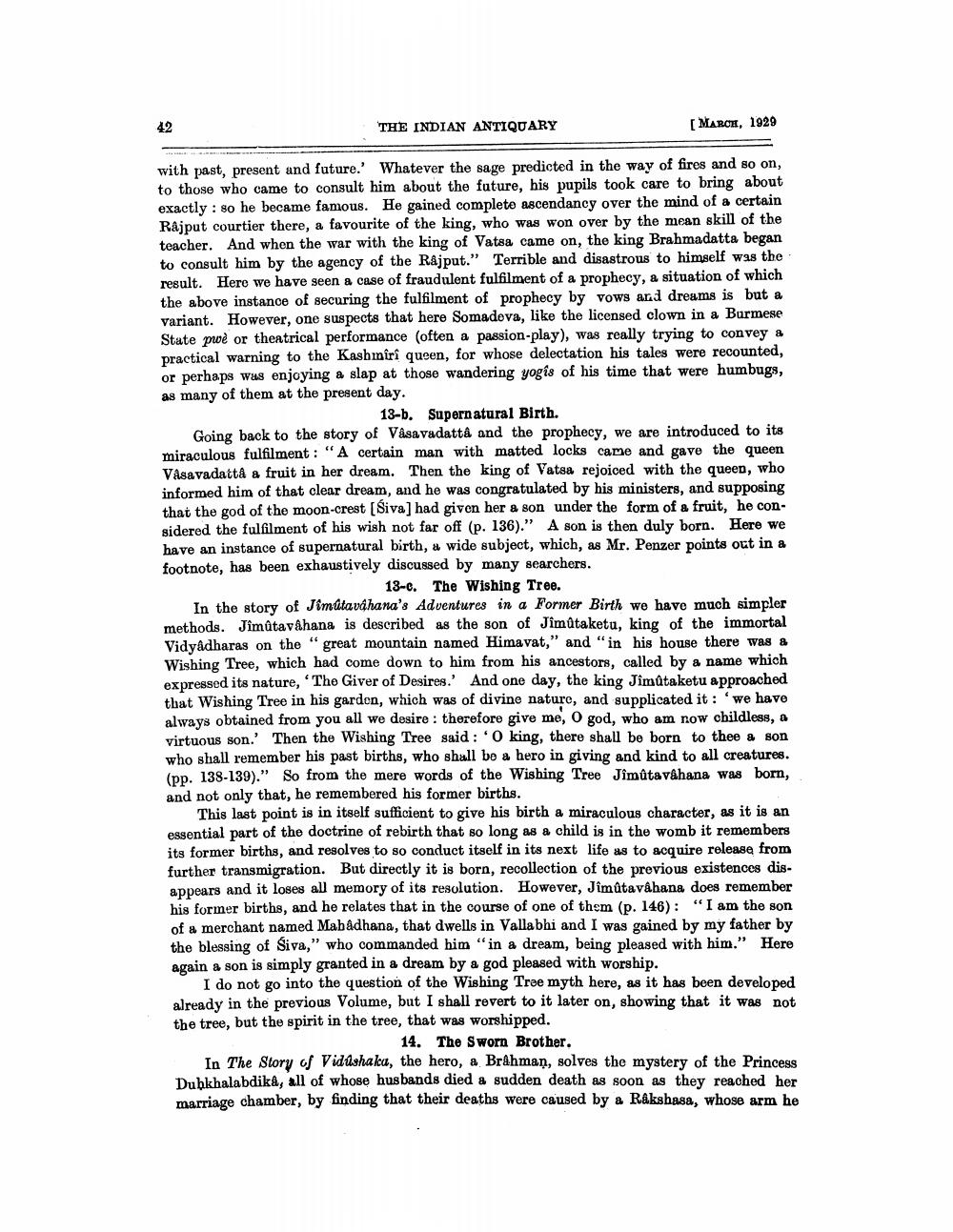________________
THE INDIAN ANTIQUARY
[ MARCH, 1929
with past, present and future. Whatever the sage predicted in the way of fires and so on, to those who came to consult him about the future, his pupils took care to bring about exactly : so he became famous. He gained completo ascendancy over the mind of a certain Rajput courtier there, a favourite of the king, who was won over by the mean skill of the teacher. And when the war with the king of Vatsa came on, the king Brahmadatta began to consult him by the agency of the Rajput." Terrible and disastrous to himself was the result. Here we have seen a case of fraudulent fulfilment of a prophecy, a situation of which the above instance of securing the fulfilment of prophecy by vows and dreams is but a variant. However, one suspects that here Somadova, like the licensed clown in a Burmese State prè or theatrical performance (often a passion-play), was really trying to convey & practical warning to the Kashmiri queen, for whose delectation his tales were recounted, or perhaps was enjoying a slap at those wandering yogís of his time that were humbugs, as many of them at the present day.
13-b. Supernatural Birth. Going back to the story of VÅsa vadatta and the prophecy, we are introduced to its miraculous fulfilment : “A certain man with matted locks came and gave the queen Vasavadattâ & fruit in her dream. Then the king of Vatsa rejoiced with the queen, who informed him of that clear dream, and he was congratulated by his ministers, and supposing that the god of the moon-crest (Siva] had given her a son under the form of a fruit, he considered the fulfilment of his wish not far off (p. 136)." A son is then duly born. Here we have an instance of supernatural birth, a wide subject, which, as Mr. Penzer points out in a footnote, has been exhaustively discussed by many searchers.
13-e. The Wishing Tree. In the story of Jimdtaváhana's Adventures in a Former Birth we have much simpler methods. Jimûtavahana is described as the son of Jimataketu, king of the immortal Vidyâdharas on the "great mountain named Himavat," and "in his house there was & Wishing Tree, which had come down to him from his ancestors, called by a name which expressed its nature, 'The Giver of Desires.' And one day, the king Jimûtaketu approached that Wishing Tree in his garden, which was of divine nature, and supplicated it: 'we have always obtained from you all we desire : therefore give me, O god, who am now childless, a virtuous son.' Then the Wishing Tree said: 'O king, there shall be born to thee a son who shall remember his past births, who shall be a hero in giving and kind to all creatures. (pp. 138-139).” So from the mere words of the Wishing Tree Jimûtavahana was born, and not only that, he remembered his former births.
This last point is in itself sufficient to give his birth a miraculous character, as it is an essential part of the doctrine of rebirth that so long as a child is in the womb it remembers its former births, and resolves to so conduct itself in its next life as to acquire release from further transmigration. But directly it is born, recollection of the previous existences disappears and it loses all memory of its resolution. However, Jimûtavahana does remember his former births, and he relates that in the course of one of them (p. 146): "I am the son of a merchant named Mabadhana, that dwells in Vallabhi and I was gained by my father by the blessing of Siva," who commanded him "in a dream, being pleased with him." Here again a son is simply granted in a dream by a god pleased with worship.
I do not go into the question of the Wishing Troe myth here, as it has been developed already in the previous Volume, but I shall revert to it later on, showing that it was not the tree, but the spirit in the tree, that was worshipped.
14. The Sworn Brother. In The Story of Vidushaka, the hero, a Brahman, solves the mystery of the Princess Dubkhalabdika, all of whose husbands died a sudden death as soon as they reached her marriage chamber, by finding that their deaths were caused by a Rakshasa, whose arm he




